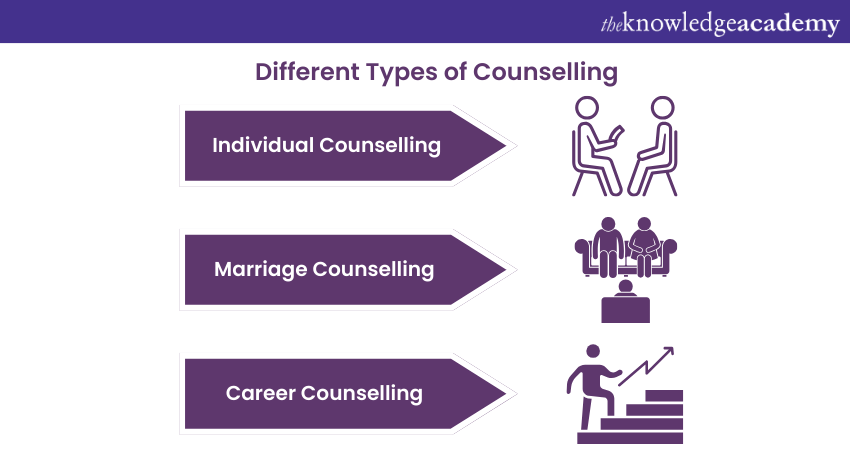A Comprehensive Overview to the Numerous Types of Coaching and Their Influence
Counseling includes a range of therapeutic approaches, each made to meet distinct psychological wellness requirements. From the structured methods of Cognitive-Behavioral Treatment to the compassionate nature of Person-Centered Therapy, these modalities provide unique pathways to individual growth. Family members treatment and Dialectical Habits Therapy provide added frameworks for recovery, while team counseling fosters area assistance. Recognizing these varied techniques can illuminate their profound effect on individual health. What stays to be explored are the complexities of each method.

Comprehending Cognitive-Behavioral Therapy (CBT)
Although many restorative approaches exist, Cognitive-Behavioral Therapy (CBT) attracts attention because of its structured, ambitious nature. This kind of therapy is based upon the facility that ideas, feelings, and actions are adjoined, and by altering adverse idea patterns, individuals can change their emotional actions and activities. CBT utilizes various techniques, such as cognitive restructuring, which helps customers identify and challenge distorted ideas. Behavior activation motivates interaction in pleasurable tasks to deal with anxiety.
Typically, CBT is a short-term treatment, usually long-term in between 12 to 20 sessions, making it obtainable for those seeking quick outcomes. Its efficiency has been well-documented in treating stress and anxiety disorders, depression, and other psychological health and wellness concerns. The therapist's role is to direct customers through exercises and research tasks, cultivating self-awareness and promoting long-lasting coping strategies. This functional technique empowers people to take control of their psychological wellness, inevitably resulting in boosted life contentment.
Checking Out Person-Centered Therapy
Person-Centered Treatment, developed by Carl Rogers, supplies a contrasting strategy to Cognitive-Behavioral Therapy by emphasizing the client's subjective experience. This healing version focuses on the person's perspective, promoting an environment of empathy, genuine positive respect, and credibility. By permitting customers to explore their sensations and ideas without judgment, specialists assist in personal development and self-discovery.
The core tenet of Person-Centered Treatment is the idea that individuals possess the integral capability for self-healing and personal advancement. In this setup, the specialist works as an encouraging guide instead of an instruction authority, encouraging customers to organize their own journey. This technique is especially reliable for those facing problems such as reduced self-esteem, stress and anxiety, or clinical depression, as it empowers them to confront and comprehend their emotions. Ultimately, Person-Centered Therapy grows a solid healing partnership, fostering count on and visibility important for significant adjustment.
The Role of Family Members Treatment in Healing
Household treatment functions as a vital component in the recovery process for people and their partnerships. This healing approach concentrates on boosting communication, resolving problems, and cultivating much deeper links amongst relative. By resolving inefficient dynamics, household therapy motivates each participant to share their thoughts and feelings in a secure setting, promoting understanding and empathy.

The impact of household therapy expands beyond the sessions, as enhanced partnerships can result in improved emotional well-being for all included. Generally, family members therapy plays a vital function in recovery by cultivating unity, durability, and common assistance among relative, ultimately leading them towards a much healthier, much more meeting life with each other.
Unloading Dialectical Behavior Modification (DBT)
Building on the structure of restorative strategies that enhance psychological wellness, Dialectical Behavior modification (DBT) offers a structured framework for individuals having problem with intense feelings and behavioral challenges. Created by Marsha Linehan, DBT incorporates cognitive-behavioral strategies with mindfulness practices, intending to help customers take care of frustrating feelings and improve interpersonal performance.
The therapy is particularly advantageous for those identified with Borderline Personality Disorder yet is additionally applicable to a variety of other psychological wellness issues. low cost therapy. DBT includes private therapy sessions and abilities training teams, concentrating on 4 essential ability sets: mindfulness, distress resistance, emotion guideline, and interpersonal efficiency
The Advantages of Team Counselling Sessions
While private treatment supplies important understandings, team therapy sessions provide distinct benefits that can substantially boost the therapeutic experience. One vital benefit is the sense of community that emerges among participants. Individuals usually discover comfort in sharing their experiences with others facing similar challenges, cultivating a helpful setting that decreases feelings of seclusion.
Furthermore, team sessions urge varied point of read more views, enabling individuals to pick up from each various other's coping methods and insights. This collective knowledge can bring about enhanced analytic capabilities and a more comprehensive understanding of individual concerns.
Furthermore, group counseling commonly promotes liability, as members motivate one another to seek their goals and follow their commitments. The cost-effectiveness of group treatment makes it an obtainable choice for several people looking for assistance. On the whole, the collective nature of group counseling sessions can substantially enhance the restorative trip.
Frequently Asked Questions
What Certifications Do Therapists Need to Exercise Therapy?
Specialists generally call for an appropriate level in psychology or therapy, together with monitored scientific experience. Furthermore, they have to acquire appropriate licensure or accreditation to practice legally, making sure adherence to specialist requirements and moral standards.
How Do I Choose the Right Kind Of Treatment for Me?
Picking the right type of therapy involves examining personal requirements, checking out numerous approaches, taking into consideration therapist specializeds, and seeking suggestions. Understanding specific objectives and choices can significantly boost the efficiency and fulfillment of the therapeutic experience.

Are Online Counseling Procedure as Effective as In-Person Ones?
The performance of online counseling sessions contrasted to in-person ones commonly depends upon individual preferences and circumstances. Research study indicates that both methods can yield favorable end results, though some might locate higher convenience in face-to-face communications.
For How Long Does Therapy Commonly Last?

What Should I Anticipate During My First Therapy Session?
During the first counseling session, customers can expect an introduction, conversation of their issues, establishment of goals, and an introduction of the counseling process - adhd counselling. This initial conference aims to develop connection and assurance convenience